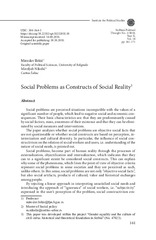Приказ основних података о документу
Social Problems as Constructs of Social Reality
| dc.creator | Brkić, Miroslav Lj. | |
| dc.creator | Nikolić, Miroljub | |
| dc.date.accessioned | 2023-03-01T11:51:22Z | |
| dc.date.available | 2023-03-01T11:51:22Z | |
| dc.date.issued | 2018 | |
| dc.identifier.issn | 1450-5460 | |
| dc.identifier.uri | http://rfpn.fpn.bg.ac.rs/handle/123456789/981 | |
| dc.description.abstract | Social problems are perceived situations incompatible with the values of a significant number of people, which lead to negative social and economic consequences. Their basic characteristics are: that they are predominantly caused by social factors, mass, awareness of their existence and that they can be eliminated by social measures and interventions. The paper analyzes whether social problems are objective social facts that are not questionable or whether social constructs are based on perception, interiorization and cultural diversity. In particular, the influence of social constructivism on the relation of social workers and users, i.e. understanding of the nature of social needs, is pointed out. Social problems, become part of human reality through the processes of externalization, objectification and internalization, which indicates that they can to a significant extent be considered social constructs. This can explain why some of the phenomena, which from the point of view of objective criteria represent social problems in some societies and they are perceived as such, unlike others. In this sense, social problems are not only “objective social facts”, but also social artifacts, products of cultural, value and historical exchanges among people. By rejecting a linear approach in interpreting unsatisfied social needs and introducing the approach of “ignorance” of social workers, i.e. “subjectivity” expressed in the user’s perception of the problem, social constructivism em phasizes the approaches to empowerment, participation and involvement. Language as a social construction in the understanding and explanation of reality and processes in social work introduces terms of strength, resources, assessment and reflection. | sr |
| dc.language.iso | en | sr |
| dc.publisher | Institute for Political Studies : Belgrade | sr |
| dc.relation | info:eu-repo/grantAgreement/MESTD/Integrated and Interdisciplinary Research (IIR or III)/47021/RS// | sr |
| dc.rights | openAccess | sr |
| dc.rights.uri | https://creativecommons.org/licenses/by/4.0/ | |
| dc.source | Serbian Political Thought | sr |
| dc.subject | social problems | sr |
| dc.subject | social constructivism | sr |
| dc.subject | objectivity | sr |
| dc.subject | subjectivity | sr |
| dc.subject | social work | sr |
| dc.title | Social Problems as Constructs of Social Reality | sr |
| dc.type | article | sr |
| dc.rights.license | BY | sr |
| dc.citation.epage | 171 | |
| dc.citation.issue | 2 | |
| dc.citation.rank | M23 | |
| dc.citation.spage | 161 | |
| dc.citation.volume | 18 | |
| dc.identifier.doi | 10.22182 | |
| dc.identifier.fulltext | http://rfpn.fpn.bg.ac.rs/bitstream/id/2509/fulltext.pdf | |
| dc.type.version | publishedVersion | sr |

